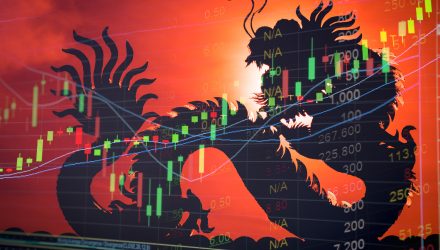After rallying on the U.S. trade deal speculation, China country-specific ETFs slipped Friday, testing their long-term support, in response to slowing inflation and lingering uncertainties over the Sino-U.S. trade negotiations.
The Xtrackers Harvest CSI 300 China A-Shares ETF (NYSEArca: ASHR) increased 14.8% and iShares China Large-Cap ETF (NYSEArca: FXI) advanced 9.7% year-to-date. However, on Friday, ASHR slipped 0.8% and FXI dipped 0.7%, with ASHR testing its long-term support at the 200-day simple moving average.
Dragging on sentiment for Chinese markets, China’s Consumer Price Index missed expectations in January. The National Bureau of Statistics revealed the inflation gauge only rose 1.7% higher year-over-year, compared to expectations that CPI would come in at 1.9% higher, CNBC reports. January also marked the seventh consecutive month of slowing factory gate inflation.
The slowing inflation figures suggested that demand “remained sluggish” at the start of 2019, Julian Evans-Pritchard, senior China economist at Capital Economics, said in a note. While CPI remains at a “comfortable level,” the weak producer price numbers are “a concern since these are highly correlated with profit growth in industry.”
Nevertheless, the deflationary fears spurred speculation that Beijing could step in with greater stimulus measures to rev up the economy. In the face of an economic slowdown, the Chinese central bank has been opening various credit facilities to make sure there is a steady supply of money for investment, with the bank cutting benchmark interest rates over the past year. Furthermore, with the Federal Reserve easing off rate hikes and lower inflationary pressures, the People’s Bank of China is expected to further cut rates.
Meanwhile, no definitive trade deal or advances in negotiations between the U.S. and China have come through. President Donald Trump, though, tried to assuage markets, stating that the U.S. was close to a deal with China, the Wall Street Journal reports. Negotiators agreed to further talks next week in Washington after a week in Beijing.
“A trade deal looks increasingly likely,” UBS Bank economist Tao Wang said. “A trade agreement may be reached sometime later when President Xi and Trump meet.”
For more information on the Chinese markets, visit our China category.
